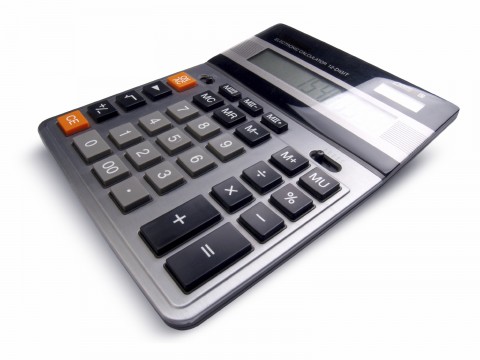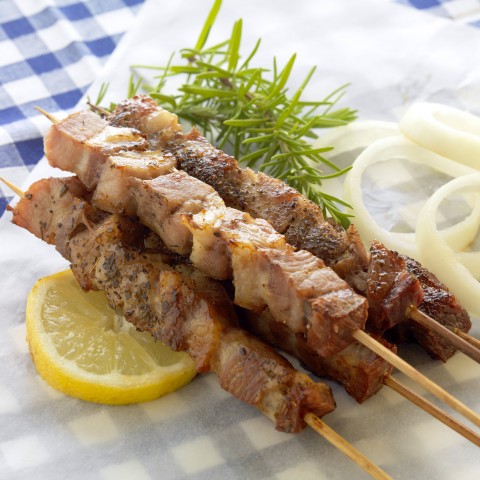
It’s finally here: The ultimate list of basic Greek words for beginners!
Whether you’ve been thinking about learning Greek or you need to freshen up your vocabulary, this list is the perfect guide to the most frequently used Greek words.
In fact, even if you haven’t studied the language before, you have the opportunity to learn and memorize your first 200 Greek words today!
Pronouns, nouns, verbs, adjectives, and even conjunctions—all the essentials in one place.
 Table of Contents
Table of Contents
1. Pronouns
The first set of words you should add to your beginner Greek vocabulary base are pronouns. These are the words we use to refer to a person, place, thing, or idea without using its name:
- The button fell off. = It fell off.
They help reduce redundancy within a sentence or paragraph, and they allow conversations to flow more smoothly.
Here, we’ll cover three types of pronouns in Greek: personal, demonstrative, and interrogative. If you’d like to learn about this topic in more detail, make sure to visit our dedicated article on Greek pronouns!
Personal Pronouns

Personal pronouns are one of the first things you should learn in any language. So, here are the ones you should know as a beginner in Greek:
1. εγώ (egó) – “I”
2. εσύ (esí) – “you”
3. αυτός (aftós) – “he”
4. αυτή (aftí) – “she”
5. αυτό (aftó) – “it”
6. εμείς (emís) – “we”
7. εσείς (esís) – “you”
8. αυτοί (aftí) – “they” (masculine)
9. αυτές (aftés) – “they” (feminine)
10. αυτά (aftá) – “they” (neuter)
Demonstrative Pronouns
Pointing at something or someone is considered to be a slightly rude gesture in Greek culture. There’s a solution, though: just use a demonstrative pronoun!
11. αυτός / αυτή / αυτό (aftós / aftí / aftó) – “this” [masculine / feminine / neuter]
12. αυτοί / αυτές / αυτά (aftí / aftés / aftá) – “these” [masculine / feminine / neuter]
13. εκείνος / εκείνη / εκείνο (ekínos / ekíni / ekíno) – “that” [masculine / feminine / neuter]
14. εκείνοι / εκείνες / εκείνα (ekíni / ekínes / ekína) – “those” [masculine / feminine / neuter]
Interrogative Pronouns
15. Τι; (Ti?) – “What?”
16. Ποιο; (Pio?) – “Which?” [neuter]
17. Ποιος; / Ποια; (Pios? / Pia?) – “Who?” [masculine / feminine]
2. Numbers

18. μηδέν (midén) – “zero”
19. ένα (éna) – “one”
20. δύο (dío) – “two”
21. τρία (tría) – “three”
22. τέσσερα (tésera) – “four”
23. πέντε (pénde) – “five”
24. έξι (éxi) – “six”
25. επτά (eptá) – “seven”
26. οκτώ (októ) – “eight”
27. εννιά (eniá) – “nine”
28. δέκα (déka) – “ten”
⇾ I know what you’re thinking. Yes, these are just the basics. But you can learn how to count in Greek in more detail on our website!
3. Nouns
Nouns are one of the most essential parts of speech. When used with verbs, they form a complete sentence—in a pinch, you can even use them by themselves to get an urgent point across! To give you a headstart, here are some Greek beginner words you can use to identify the people, places, and objects around you.
⇾ Make sure to read our article on the top 100 Greek nouns to pick up even more useful vocabulary.
Time

29. η ημέρα (i iméra) – “day”
30. ο μήνας (o mínas) – “month”
31. το έτος (to étos) – “year” [formal]
32. η χρονιά (i hroniá) – “year” [informal]
33. η ημερομηνία (i imerominía) – “date”
34. η εβδομάδα (i evdomáda) – “week”
35. το σήμερα (to símera) – “today”
36. το αύριο (to ávrio) – “tomorrow”
37. το χθες (to hthes) – “yesterday”
38. η Δευτέρα (i Deftéra) – “Monday”
39. η Τρίτη (i Tríti) – “Tuesday”
40. η Τετάρτη (i Tetárti) – “Wednesday”
41. η Πέμπτη (i Pémpti) – “Thursday”
42. η Παρασκευή (i Paraskeví) – “Friday”
43. το Σάββατο (to Sávato) – “Saturday”
44. η Κυριακή (i Kiriakí) – “Sunday”
45. η ώρα (óra) – “hour”
46. το λεπτό / τα λεπτά (to leptó / ta leptá) – “minute” / “minutes”
47. το δευτερόλεπτο / τα δευτερόλεπτα (to defterólepto / ta defterólepta) – “second” / “seconds”
48. το πρωί (to proí) – “morning”
49. το μεσημέρι (to mesiméri) – “afternoon” / “midday”
50. το απόγευμα (to apógevma) – “evening”
51. το βράδυ (to vrádi) – “night”
⇾ Reading and writing dates in Greek is easy. In our article on dates and days of the week, you’ll learn everything you need to know.
People

52. η οικογένεια i ikoyénia) – “family”
53. οι γονείς (i gonís) – “parents”
54. η μητέρα / μαμά (i mitéra / mamá) – “mother” / “mom”
55. ο πατέρας / μπαμπάς (o patéras / babás) – “father” / “dad”
56. η αδερφή (i aderfí) – “sister”
57. ο αδερφός (o aderfós) – “brother”
58. η γιαγιά (i yayá) – “grandmother”
59. ο παππούς (o papús) – “grandfather”
60. το παιδί / τα παιδιά (to pedí / ta pediá) – “child” / “children”
61. η κόρη (i kóri) – “daughter”
62. ο γιος (o yos) – “son”
⇾ Do you need a word about family relations that’s not listed above? Well, how about reading our dedicated Greek family terms article?

63. ο / η δικηγόρος (o / i dikigóros) – “lawyer”
64. ο / η γιατρός (o / i yatrós) – “doctor”
65. ο νοσοκόμος / η νοσοκόμα (o nosokómos / i nosokóma) – “nurse” [masculine / feminine]
66. ο / η αστυνομικός (o / i astinomikós) – “police officer”
67. ο / η υπάλληλος (o / i ipálilos) – “employee”
68. ο δάσκαλος / η δασκάλα (o dáskalos / i daskála) – “teacher” [masculine / feminine]
69. πωλητής (politís) – “salesperson”
70. φαρμακοποιός (farmakopiós) – “pharmacist”
71. o κύριος (o kírios) – “Mr.”
72. η κυρία (i kiría) – “Ms.”
Around Town

73. ο δρόμος (o drómos) – “road”
74. το σπίτι (to spíti) – “house”
75. το αεροδρόμιο (to aerodrómio) – “airport”
76. το κέντρο της πόλης (to kéndro tis pólis) – “the center of the city”
77. το πάρκο (to párko) – “park”
78. το ξενοδοχείο (to xenodohío) – “hotel”
79. το νοσοκομείο (to nosokomío) – “hospital”
80. η τράπεζα (i trápeza) – “bank”
81. το σχολείο (to sholío) – “school”
82. το σούπερ μάρκετ (to súper márket) – “supermarket”
School & Office Essentials
83. το βιβλίο (to vivlío) – “book”
84. το τετράδιο (to tetrádio) – “notebook”
85. το μολύβι (to molívi) – “pencil”
86. το στυλό (to stiló) – “pen”
87. ο ηλεκτρονικός υπολογιστής (o ilektronikós ipoloyistís) – “computer”
88. ο φορητός υπολογιστής (o foritós ipoloyistís) – “laptop”
89. το κινητό τηλέφωνο / το κινητό (to kinitó tiléfono / to kinitó) – “cellphone”
Body Parts

90. το σώμα (to sóma) – “body”
91. το κεφάλι (to kefáli) – “head”
92. ο ώμος / οι ώμοι (o ómos / i ómi) – “shoulder” / “shoulders”
93. το χέρι / τα χέρια (to héri / héria) – “hand” / “hands”
94. το πόδι / τα πόδια (to pódi / ta pódia) – “leg” / “legs”
95. το πρόσωπο (to prósopo) – “face”
96. το στήθος (to stíthos) – “chest”
97. το μάτι / τα μάτια (to máti / ta mátia) – “eye” / “eyes”
98. το αυτί / τα αυτιά (to aftí / ta aftiá) – “ear” / “ears”
99. η μύτη (i míti) – “nose”
100. το στόμα (to stóma) – “mouth”
Food

101. το πιρούνι (to pirúni) – “fork”
102. το μαχαίρι (to mahéri) – “knife”
103. το κουτάλι (to kutáli) – “spoon”
104. το πιάτο (to piáto) – “plate”
105. το ποτήρι (to potíri) – “glass”
106. το νερό (to neró) – “water”
107. το κρασί (to krasí) – “wine”
108. το τσάι (to tsái) – “tea”
109. η μπύρα (i bíra) – “beer”
110. το λαχανικό / τα λαχανικά (to lahanikó / ta lahaniká) – “vegetable” / “vegetables”
111. η ντομάτα (i domáta) – “tomato”
112. η πατάτα (i patáta) – “potato”
113. το κοτόπουλο (to kotópulo) – “chicken”
114. το χοιρινό (to hirinó) – “pork”
115. το μοσχάρι (to moshári) – “beef”
116. το φρούτο / τα φρούτα (to frúto / ta frúta) – “fruit” [singular / plural]
117. το αυγό (to avgó) – “egg”
118. το γάλα (to gála) – “milk”
⇾ Are you hungry? Then think twice before reading our article on Greek food. Proceed at your own risk, because you’ll certainly start craving some of the dishes!
4. Verbs
Verbs are the words we use to identify an action or state of being. When used with nouns, they form a complete sentence. If you’re ready to start building your own sentences, these essential verbs in Greek for beginners are a great place to start.

119. πηγαίνω (piyéno) – “to go”
120. παίρνω (pérno) – “to get” / “to take”
121. δίνω (díno) – “to give”
122. φτιάχνω (ftiáhno) – “to make”
123.κάνω (káno) – “to do”
124. δουλεύω (dulévo) – “to work”
125. βάζω (vázo) – “to put”
126. δοκιμάζω (dokimázo) – “to try”
127. λέω (léo) – “to tell”
128. μιλάω / μιλώ (miláo / miló) – “to talk”
129. ρωτάω / ρωτώ (rotáo / rotó) – “to ask”
130. μετακινώ (metakinó) – “to move (something)”
131. σκέφτομαι (skéftome) – “to think”
132. αισθάνομαι (esthánome) – “to feel”
133. ξέρω (xéro) – “to know”
134. θέλω (thélo) – “to want”
135. πιστεύω (pistévo) – “to believe”
136. καταλαβαίνω (katalavéno) – “to understand”
137. αγαπάω / αγαπώ (agapáo / agapó) – “to love”
138. θυμάμαι (thimáme) – “to remember”
139. είμαι (íme) – “to be”
140. έχω (ého) – “to have”
141. παίζω (pézo) – “to play”
142. πεινάω / πεινώ (pináo / pinó) – “to be hungry”
143. βλέπω (vlépo) – “to see”
144. διαβάζω (diavázo) – “to read”
145. μαθαίνω (mathéno) – “to learn”
146. περπατάω / περπατώ (perpatáo / perpató) – “to walk”
147. τρέχω (trého) – “to run”
148. φεύγω (févgo) – “to leave”
149. γράφω (gráfo) – “to write”
150. απαντάω / απαντώ (apandáo / apandó) – “to answer”
151. μετράω / μετρώ (metráo / metró) – “to count”
5. Adjectives
Becoming familiar with basic Greek adjectives will help you add spice to your conversations and flair to your writing. Below, you’ll find the most commonly used adjectives in a variety of categories.
Describing Objects
152. μεγάλος (megálos) – “big”
153. μικρός (mikrós) – “small”
154. φαρδύς (fardís) – “wide”
155. στενός (stenós) – “narrow”
Describing Colors

156. κόκκινο (kókino) – “red”
157. μπλε (ble) – “blue”
158. πράσινο (prásino) – “green”
159. κίτρινο (kítrino) – “yellow”
160. καφέ (kafé) – “brown”
161. μαύρο (mávro) – “black”
162. άσπρο (áspro) – “white”
163. πορτοκαλί (portokalí) – “orange”
164. ροζ (roz) – “pink”
165. γκρι (gkri) – “gray”
166. μωβ (mov) – “purple”
167. ασημί (asimí) – “silver”
168. χρυσό (hrisó) – “gold”
Describing People
169. όμορφος (ómorfos) – “handsome”
170. όμορφη (ómorfi) – “beautiful”
171. άσχημος (áshimos) – “ugly”
172. γοητευτικός (goiteftikós) – “charming”
173. χοντρός (hontrós) – “fat”
174. αδύνατος (adínatos) – “slim” / “thin”
175. ψηλός (psilós) – “tall”
176. κοντός (kondós) – “short”
177. δυνατός (dinatós) – “strong”
178. αδύναμος (adínamos) – “weak”
Describing the Weather

179. ηλιόλουστος (iliólustos) – “sunny”
180. βροχερός (vroherós) – “rainy”
181. συννεφιασμένος (sinefiazménos) – “cloudy”
182. ζεστός (zestós) – “warm”
183. κρύος (kríos) – “cold”
⇾ Of course, there are many more words and phrases you can use to describe the weather! Visit our weather article to find out more!
Describing Emotions & Behavior
184. καλός (kalós) – “good”
185. ευγενικός (evyenikós) – “kind”
186. φιλικός (filikós) – “friendly”
187. χαρούμενος (harúmenos) – “happy”
188. αστείος (astíos) – “funny”
189. κακός (kakós) – “bad”
190. θυμωμένος (thimoménos) – “angry”
191. αγενής (ayenís) – “rude”
6. Conjunctions
και (ke) – “and”
αν / εάν (an / eán) – “if”
γιατί (yatí) – “because”
αλλά (alá) – “but”
όμως (ómos) – “however” / “nevertheless”
ώστε (óste) – “(so) that”
όταν (ótan) – “when”
πριν (prin) – “before”
ή (í) – “or”
⇾ You’ll better understand conjunctions once you see how they work in complete sentences. Therefore, don’t forget to check out our Greek conjunctions article.
7. How GreekPod101 Can Help You Master Greek
In this article, we covered some of the most essential Greek words for the beginner level. If you’re a complete novice, this list might feel a bit too much for you, so just take it step by step. If you break it down to the basics, you can really master the Greek language!
All you need to clear things up is a bit of help from a Greek teacher.
What if you could have access to educational material from real teachers?
GreekPod101.com offers you a free lifetime account granting you access to high-quality, practical knowledge about the Greek language. At GreekPod101.com, we aim to provide you with everything you need to know about Greek in a fun and interesting way.
And if you need a bit more help, you can also upgrade to Premium PLUS and take advantage of our MyTeacher program. This service allows you to learn Greek with your own personal teacher, who will answer any questions you might have!
Stay tuned for more articles like this one, word lists, grammar tips, and even YouTube videos, which are waiting for you to discover them!
Before you go, let us know in the comments how many of these words were new to you—were there any you already knew? We look forward to hearing from you!










